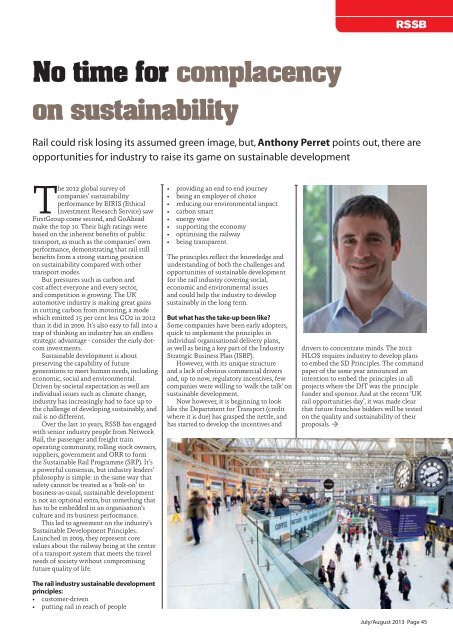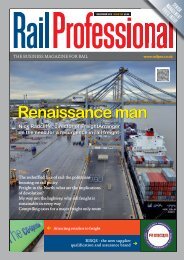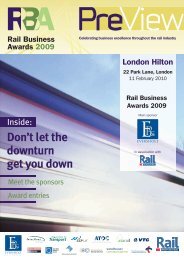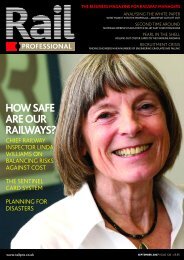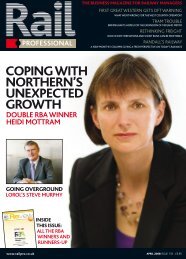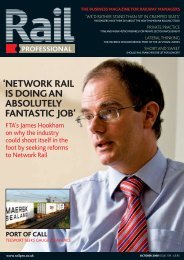View as PDF - Rail Professional
View as PDF - Rail Professional
View as PDF - Rail Professional
You also want an ePaper? Increase the reach of your titles
YUMPU automatically turns print PDFs into web optimized ePapers that Google loves.
ssb<br />
<strong>Rail</strong> could risk losing its <strong>as</strong>sumed green image, but, Anthony Perret points out, there are<br />
opportunities for industry to raise its game on sustainable development<br />
The 2012 global survey of<br />
companies’ sustainability<br />
performance by EIRIS (Ethical<br />
Investment Research Service) saw<br />
FirstGroup come second, and GoAhead<br />
make the top 10. Their high ratings were<br />
b<strong>as</strong>ed on the inherent benefits of public<br />
transport, <strong>as</strong> much <strong>as</strong> the companies’ own<br />
performance, demonstrating that rail still<br />
benefits from a strong starting position<br />
on sustainability compared with other<br />
transport modes.<br />
But pressures such <strong>as</strong> carbon and<br />
cost affect everyone and every sector,<br />
and competition is growing. The UK<br />
automotive industry is making great gains<br />
in cutting carbon from motoring, a mode<br />
which emitted 15 per cent less CO2 in 2012<br />
than it did in 2000. It's also e<strong>as</strong>y to fall into a<br />
trap of thinking an industry h<strong>as</strong> an endless<br />
strategic advantage - consider the early dotcom<br />
investments.<br />
Sustainable development is about<br />
preserving the capability of future<br />
generations to meet human needs, including<br />
economic, social and environmental.<br />
Driven by societal expectation <strong>as</strong> well are<br />
individual issues such <strong>as</strong> climate change,<br />
industry h<strong>as</strong> incre<strong>as</strong>ingly had to face up to<br />
the challenge of developing sustainably, and<br />
rail is no different.<br />
Over the l<strong>as</strong>t 10 years, RSSB h<strong>as</strong> engaged<br />
with senior industry people from Network<br />
<strong>Rail</strong>, the p<strong>as</strong>senger and freight train<br />
operating community, rolling stock owners,<br />
suppliers, government and ORR to form<br />
the Sustainable <strong>Rail</strong> Programme (SRP). It’s<br />
a powerful consensus, but industry leaders’<br />
philosophy is simple: in the same way that<br />
safety cannot be treated <strong>as</strong> a ‘bolt-on’ to<br />
business-<strong>as</strong>-usual, sustainable development<br />
is not an optional extra, but something that<br />
h<strong>as</strong> to be embedded in an organisation’s<br />
culture and its business performance.<br />
This led to agreement on the industry’s<br />
Sustainable Development Principles.<br />
Launched in 2009, they represent core<br />
values about the railway being at the centre<br />
of a transport system that meets the travel<br />
needs of society without compromising<br />
future quality of life.<br />
The rail industry sustainable development<br />
principles:<br />
• customer-driven<br />
• putting rail in reach of people<br />
• providing an end to end journey<br />
• being an employer of choice<br />
• reducing our environmental impact<br />
• carbon smart<br />
• energy wise<br />
• supporting the economy<br />
• optimising the railway<br />
• being transparent<br />
The principles reflect the knowledge and<br />
understanding of both the challenges and<br />
opportunities of sustainable development<br />
for the rail industry covering social,<br />
economic and environmental issues<br />
and could help the industry to develop<br />
sustainably in the long term.<br />
But what h<strong>as</strong> the take-up been like<br />
Some companies have been early adopters,<br />
quick to implement the principles in<br />
individual organisational delivery plans,<br />
<strong>as</strong> well <strong>as</strong> being a key part of the Industry<br />
Strategic Business Plan (ISBP).<br />
However, with its unique structure<br />
and a lack of obvious commercial drivers<br />
and, up to now, regulatory incentives, few<br />
companies were willing to 'walk the talk' on<br />
sustainable development.<br />
Now however, it is beginning to look<br />
like the Department for Transport (credit<br />
where it is due) h<strong>as</strong> gr<strong>as</strong>ped the nettle, and<br />
h<strong>as</strong> started to develop the incentives and<br />
drivers to concentrate minds. The 2012<br />
HLOS requires industry to develop plans<br />
to embed the SD Principles. The command<br />
paper of the same year announced an<br />
intention to embed the principles in all<br />
projects where the DfT w<strong>as</strong> the principle<br />
funder and sponsor. And at the recent ‘UK<br />
rail opportunities day’, it w<strong>as</strong> made clear<br />
that future franchise bidders will be tested<br />
on the quality and sustainability of their<br />
proposals.<br />
July/August 2013 Page 45


